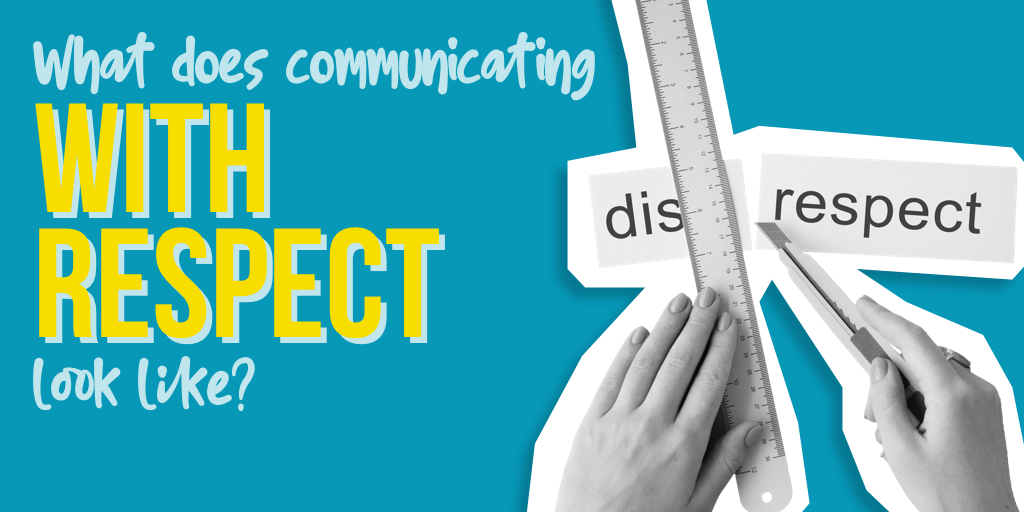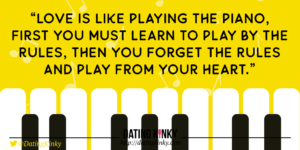Six weeks ago, I wrote that communication is a tool, not a solution. I mentioned that without a few key elements, communication is more likely to harm than to heal. Those are:
- Priorities
- Openness
- Respect
- Compassion
- Autonomy
So far, I’ve covered priorities and openness. Today, I’m tackling respect.
And I’ve been sort of wrestling with this. Because I think it’s a challenge to show what I mean by respect in actual examples.
It is.
Because a lack of respect can show in so many millions of ways that I could never cover them all.
So, instead, I’m going to focus on the effect of respect in a conversation.
Let’s talk about what respect is, first.
Type “define respect” into the Google, and you will get three definitions:
noun 1. a feeling of deep admiration for someone or something elicited by their abilities, qualities, or achievements.
noun 2. due regard for the feelings, wishes, rights, or traditions of others.
verb 1. admire (someone or something) deeply, as a result of their abilities, qualities, or achievements.
Admiration comes up in two of those definitions.
When was the last time you were in an argument with someone you loved and you felt…admired?
I’m guessing some of you will be able to honestly say, “Never, not once.”
Most of you will be able to say, “Not often, been a while.”
Some few will be able to say, “It happens.”
And maybe one or two percent will be able to say, “More often than not.”
Which is sad.
BUT, let’s turn this around, shall we?
If you were to ask your partner how often you make them feel admired when you’re arguing, what would they say?
And don’t ask them when you’re basking in post-coital bliss, but when you are arguing. LOL!
So, admiration. “Elicited by their abilities, qualities, or achievements.”
What might this mean? Well, let’s imagine a bit. What do we do with people we respect? What do you do when someone you deeply respect is speaking?
✅ Do you shut up and listen?
✅ Do you listen to all of their words before responding?
✅ Do you think about what they are saying?
✅ Do you try to understand their points?
✅ Do you validate them by agreeing, or by acknowledging their thought processes?
✅ Do you respond with care for your words?
✅ Do you keep a reasonable tone of voice?
✅ Do you engage with humility?
There may be some of you out there whose cultures demand that you acknowledge your admiration for a worthy adversary or a respected foe by being as loud and as strong as possible, because you know that they will always bring their best…
Sure.
I’ll just say that your partners and friends, though, are not your foes, and if that’s how you’re treating them, it’s time to turn that around.
Feeling disrespected/unappreciated/invalidated will shut down a conversation.
Or rather, it will prevent progress.
The words will likely not stop. Nor will the yelling, the tears, the upset, the anger…
But they will not lead you forward. You will not move towards your priorities. You will not share openly. You will be far more likely to do harm than good.
And notice what I said there: FEELING disrespected.
In this case, it’s not even whether you respect them or not (more on that in a second), but whether or not they feel respected by you, in that moment, in that conversation.
And that will determine how they move forward with you.
Whether you feel respect will play a big part in whether or not they feel respected.
Although, I’ll be the first to tell you that respecting someone does not necessarily mean that they feel it. But if you do not respect someone, I can tell you with a 97% (=/- 2%) surety that they will not feel respected.
Unless they are an incredibly oblivious narcissist or you are a brilliant actor, or both.
So, your lack of respect will bleed through into everything you communicate.
Let me give you an example. A man wrote to me about wanting a woman-led relationship with his wife, and said to me, “I just know she would love it, but she doesn’t know what she would love.”
Ugh.
He doesn’t even trust the woman he claims to love (and claims to want to follow) to know her own mind.
Do you think that MAYBE his lack of respect for her comes across in his communication TO her, and that maybe it shuts her down? Makes her not want to actually be fully open and honest with him about her wants and needs?
And, I dunno, makes her feel like his “desire” for a woman-led relationship (that he’s trying to talk her into, LMAO) might be disingenuous or actually self-serving, rather than for her benefit?
Maybe?
Bueller?
Bueller?
Now, were I to ask this person if he respected his wife, he would say yes, because I did, and he assured me he did. That it was complicated. That when you know someone as well as you do, and you know what they want better than they do…
Eh.
So, yeah, having respect for the person is the first step in communicating your respect for them.
And that also means being honest with yourself.
Unlike that guy.
Let’s go back to those questions I asked, and ask them a bit differently:
✅ Do you shut up and listen because you want to hear what they have to say?
✅ Do you listen to all of their words before responding because you want to hear everything they have to say?
✅ Do you think about what they are saying because you want to give their thoughts and feelings your mental attention?
✅ Do you try to understand their points, because you know that you will be improved through that understanding?
✅ Do you validate them by agreeing, or by acknowledging their thought processes because you believe that what they are saying is valid (even when you disagree)?
✅ Do you respond with care for your words because you believe they deserve your care?
✅ Do you keep a reasonable tone of voice because you want to communicate, and not shout them down?
✅ Do you engage with humility because they are amazing and important to you in this conversation?
Or…no?
And if no, perhaps thinking through what respect means to you and how you communicate it in your relationships and conversations could be a worthwhile exercise.
Let me be clear.
I am not perfect.
I do not always get this right. If I said I did, I would be lying.
Just the other day, I had a craptaculous week, topped by a shitty day with all sorts of stressors (not all bad, but all of them stressful), and I apologized to my partner about something, and he spat at me, and 20 minutes later, after we’d lanced that boil, I realized that for the first time in I don’t know how long, we had just fought over nothing.
❌ I did NOT shut up and listen.
❌ I did NOT listen to all of his words before responding.
❌ I did NOT think about what he was saying.
❌ I did NOT try to understand his points.
❌ I did NOT validate him.
❌ I did NOT respond with care for my words.
❌ I did NOT keep a reasonable tone of voice.
❌ I did NOT engage with humility.
And neither did he. And another thing neither of us did? We did not attack. We did not call names. We just went…totally ballistic on each other.
Luckily, the spat was over nothing, and it was actually needed. A release of pressure.
And we got on with our day with a tight hug and some words of love.
I guess we’ve used up our fight quota for 2022, then. LOL!
What are your thoughts?
Do you feel respected and admired in your communications with the people closest to you?
Do you respect the people you communicate with? Like, REALLY respect them? And show them through your communication actions?
Do you feel that your communication has suffered from a lack of respect in the past? Or now?










